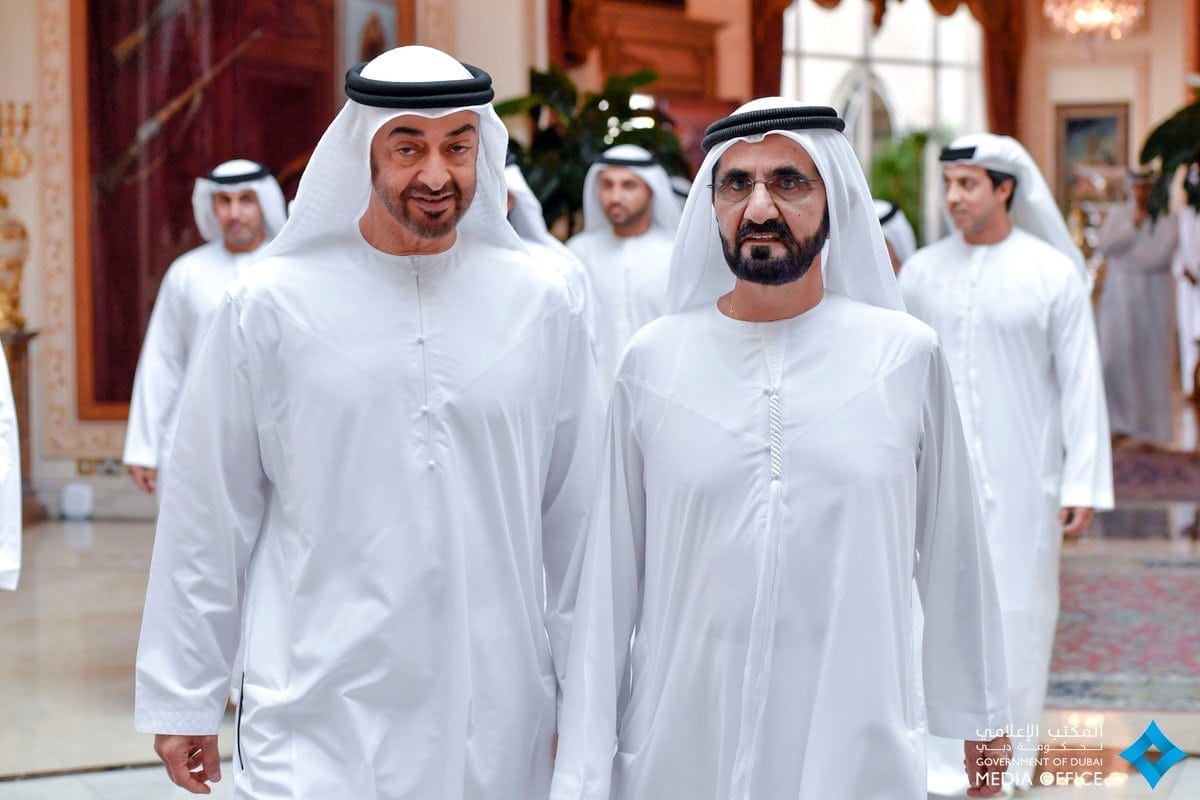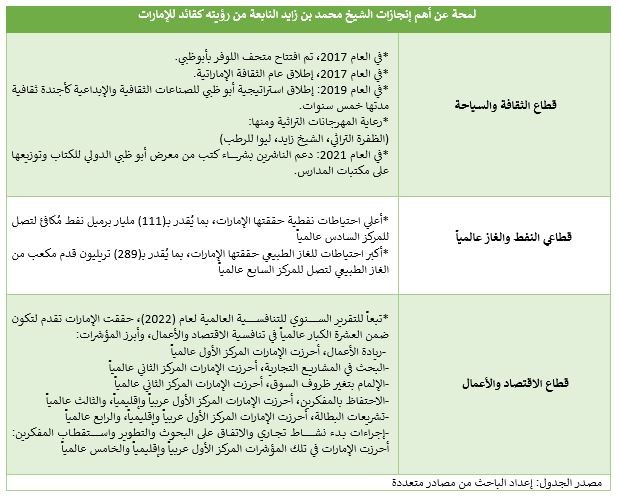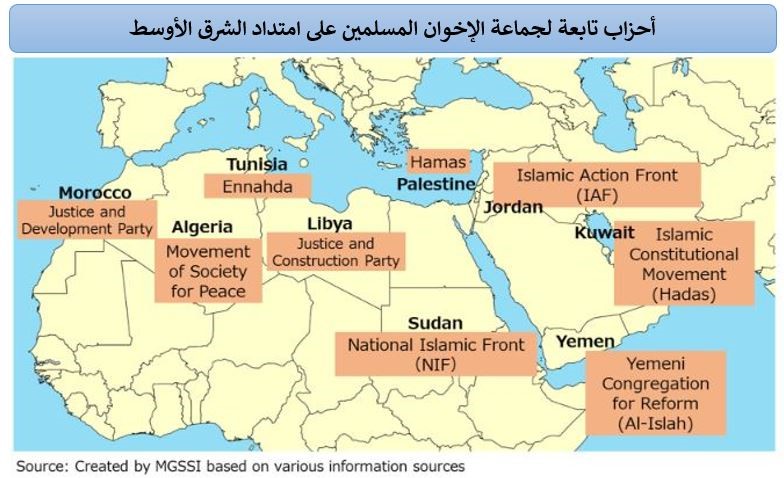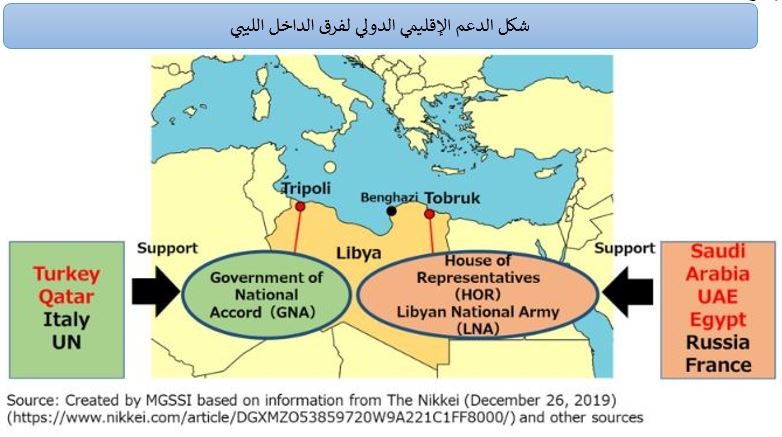
Mohammed bin Zayed and Mohammed bin Rashid (WAM)
29-05-2022 at 4 PM Aden Time

Nancy Zidan (South24)
The Zayed Document, signed by the UAE founder, Sheikh Zayed Bin Sultan 50 years ago, still secures a soft transition of power. It determines the powers owned by the UAE president and his successors. Since 1972, the Emirati constitution stipulates that when the president position becomes vacant, his powers are automatically transferred to the vice president for a one- month transitional period. Then, a new president is elected among members of the Federal Supreme Council for a five-years presidential term. However, Vice President and Dubai Ruler, Mohammed Bin Rashid, was quick to invite the Federal Supreme Council for a meeting, one day after the death of Sheikh Khalifa Bin Zayed. He revealed consensus agreement by the rulers of the seven UAE emirates to pledge allegiance to the ruler of Abu Dhabi and Deputy Supreme Commander of the UAE Armed Forces, Mohammed Bin Zayed, as the UAE president. According to the prevailing custom since the UAE foundation, the ruler of the capital Abu Dhabi president is the president while the Dubai ruler is the vice president [1].
The funeral of Sheikh Khalifa Bin Zayed served as a vital event for all countries regionally and internationally. The presidents and ministers across the world participated in the funeral. However, there was special focus on the representatives of the states seeking for a new start in their relationships with the UAE under its new legitimized president. Those leaders included for example UK PM Boris Johnson, Israeli President Isaac Herzog, US Vice President Kamala Harris, and French President Emmanuel Macron among others who immediately visited the UAE to offer their condolences [2]. The presence of Iran’s Vice President, Hussein Amir Abdullahian was also a remarkable one [3].
This analysis is an attempt to explore the nature of the developments which could emerge in UAE policies during the next stage based upon the view of the UAE authorities led by Sheikh Mohammed Bin Zayed. It should be noted that the latter has been the virtual leader who has held power in the UAE for a long time.
Strengthening the UAE's internal front
Mohammed Bin Zayed helped in polishing the image of the UAE as a social liberal oasis and a backer of cross-border business. This has been accompanied with high-tech monitoring that covers the state internally. If Khalifa Bin Zayed's era is defined as the "empowerment stage" as he enhanced the internal coherence among the state’s internal components, we can describe Mohammed Bin Zayed's era as a phase of building the Emirati internal structure to a deep level of integration. He is remarkably skillful in gathering contradictions as well as creating balance and harmonizations regionally and internationally.

Gatherer of contradictions
First: old allies and renewable interests
A) The US and Russia and the international extension
In a phone call, US President Joe Biden congratulated his new UAE counterpart despite the tense relationships between the US and Mohammed Bin Zayed over the recent months prior to the latter's ascending to power. The US sent warnings to Bin Zayed regarding the ties he has built with Damascus as he hosted Syrian President Bashar Al-Assad's. Moreover, the Yemen War has been a source of some disagreements between the two parties. In a public statement, Biden said that he is looking forward to enhancing the relationships with his "old friend". Additionally, Harris led a delegation who visited the UAE seeking for re-establishing a mutual strong partnership [4].
Over the past years, Bin Zayed has forged close relationships with Washington by providing the services of the UAE and its armed forces to help the western military efforts in the region. In 1991, during the months that followed the Iraqi invasion of Kuwait, the relationship between the then young prince Mohammed Bin Zayed and Washington began. He wanted to buy a lot of equipment to protect his country. Thus, the Pentagon deemed him as a promising partner. They believed that this prince and the helicopter pilot who received training in the UK had a serious mindset. Bin Zayed convinced his father to transfer 4 billion dollars to the US to help it in paying the costs of the 1991 War in Iraq [5]. Additionally, special Emirati forces were deployed alongside the Americans in Afghanistan, Kosovo, Somalia and Libya.
The UAE was a member of the international coalition established by the US to fight ISIS in Iraq and Syria [6]. Bin Zayed enhanced the capabilities of his army by using American weapons. He then developed the UAE defense industry such as producing an amphibious armored vehicle known as "the Monster" [7]. He also opened the fields of military cooperation technically with various developed countries. His country spent much money to buy US-made weapons and to hire lobby groups for promoting the UAE interests in Washington. It spent about 21 million dollars on lobby groups in 2017 as well as granting millions for major research centers. Mohammed Bin Zayed is probably the richest man in the world as he controls sovereign wealth funds with a total value exceeding 1.3 trillion dollars which is more than any other state [8]. Furthermore, the UAE plays an important role as one of the biggest oil and gas producers and an OPEC member. This comes amid troubles that hit the global energy market which have been further exacerbated because of the war in Ukraine.
Bin Zayed is credited with maintaining a close relationship with Putin's Russia over years. Following the February Russian invasion of Ukraine, Bin Zayed offered his help to find a peaceful solution among the warring states [9]. The UAE adopted a stance which is independent from Washington and more consistent with Saudi Arabia regarding the rate of oil production set by OPEC. The UAE adopted this position of not supporting the West due to the Biden administration which didn't show much support when Abu Dhabi was attacked by the Houthis. This pushed Boris Johnson to visit the UAE and the KSA several weeks ago to create a negotiation space. The death of Sheikh Khalifa and the ascendance of Sheikh Mohammed to officially succeed him was an opportunity intentionally exploited by the West to show goodwill and for rapprochement with the UAE.
B) The KSA and Egypt
Over the last 5 years, the Saudi-Emirati relationships have reached an advanced level of solidity and are expected to be enhanced in the future. Sheikh Mohammed enjoys special relationships with Saudi Crown Prince Mohammed Bin Salman. It sounds like a mentor-learner relationship as Bin Salman looks at the older Mohammed Bin Zayed as a role model for what can be achieved in the Gulf. Bin Zayed is expected to continue playing an influential and important role at the level of Saudi policies to maintain the close coordination between the two governments. Bin Salman looked at what the UAE has locally achieved regarding attracting foreign investment, business and tourism. With the "Saudi Vision 2030", Bin Salman would like very much to repeat Bin Zayed's successful strategy [10].
Moreover, it is not a secret to notice the close friendship between Mohammed Bin Zayed and Egypt under the rule of President Abdelfattah Al-Sissi. They enjoy strong relationships as they constantly discuss the ways to enhance their deep relationship and the fields of common cooperation economically, politically and diplomatically. Bin Zayed supported Al-Sissi as Egypt's leader against the Muslim Brotherhood rule during the June 30th Revolution [11]. He also implemented bold moves against the MB which deeply threatens the Middle East according to him [12].
The UAE fought the MB presence in Qatar and Turkey where the group found care and stability. The Quartet (the KSA, the UAE, Egypt and Bahrain) began boycotting Qatar in 2017 as they look at the MB as a terrorist organization. The boycott continued until Qatar ended its support of the MB. The diplomatic relationships were restored in January 2021 through an agreement between the Quartet and Qatar [13]. Mohammed Bin Zayed remained a main axis in fighting the MB presence in the Arab World. It is remarkable that Mohammed Bin Zayed's father had appointed the Prominent MB member Izz Al-Din Ibrahim as a teacher to his young son, Prince Mohammed. Ibrahim had tried to inject his ideology into Bin Zayed's brain but this helped the latter to realize the reality and goals of the MB according to what Sheikh Mohammed repeatedly confirmed [14].
The MB still has branches in other countries around the world especially in the Middle East in Jordan, Palestine (Gaza), Kuwait, Yemen, Libya, Tunisia, Algeria, Morocco and Sudan. Turkey and Qatar often supported these islamic parties. On the other hand, the UAE, the KSA and Egypt don't support the parties which are based upon religious identity.

For example, Sheikh Mohammed provided weapons to Khalifa Haftar forces in Libya defying the US pleas and the UN embargo. Furthermore, Emirati Pilots carried out airstrikes in Tripoli and ultimately established an air base in east of Libya [15]. In 2021, Sheikh Mohammed met in the UAE with Abdulhamid Al- Dabaiba the then Head of the internationally-recognized Libyan government. After the meeting, Bin Zayed tweeted that he stands with the Libyan people to overcome challenges [16].

However, the UAE has recently demonstrated openness towards Turkey if the latter cuts its support of the MB which would allow the re-assessment of its relationships with the Arabs. This is what really happened as diplomatic space has emerged between Turkey and Arabs. Qatar has also been contained within the GCC [17]. Zayed's UAE is expected to continue providing diplomatic spaces to enhance the economic and political opportunities as part of the pragmatic approach often adopted by Bin Zayed.
Secondly: the UAE between confrontation and creating harmonizations
A) Iran and Yemen
In the Middle East, Bin Zayed is considered one of the biggest opposers of the influence of Iran and its armed proxies.[18] the Emirati regional policy apparently confronted the Iranian expansion in the Middle East in 2015 when the UAE and the KSA launched a war against the Iran-backed Houthis in Yemen. However, the UAE later returned to a more diplomatic approach. In 2019, Sheikh Mohammed withdrew his forces from the conflict. Over the past years, he stressed the UAE's desire to see an end to the Yemeni civil conflict through political negotiations [19]. Since 2015, he has delivered over 6 billion dollars of diplomatic, humanitarian and development assistance to Yemen. In last January, the UAE supported Yemen in the Security Council [20]. In April, it also welcomed the establishment of the Yemeni Presidential Council which visited the UAE in early May. Sheikh Mohammed stressed that the UAE backs the efforts of the new Yemeni Presidential Council to achieve stability and security in the country [21].
It is worth mentioning that the partial Emirati withdrawal from Yemen came in conjunction with clear UAE efforts to reduce tensions with Iran especially after the latter began to attack ships in May 2019, and it is downing of a US drone in June 2019. The UAE feared that the US won’t protect it in case of the outbreak of a conflict as the Trump Administration was avoiding a military confrontation with Iran. The Emirati politicians often stick to de-escalation and finding political solutions for the disputes in the region [22]. There are broad spaces of cooperation between the UAE and Iran as the actual volume of trade exchange between the UAE and Iran in 2021 reached about 2.243 billion dollars [23]. The operation of building relationship is slow but it won’t be a surprise if we see Mohammed Bin Zayed push it forward [24].
Abu Dhabi is very interested in asserting its presence on the maritime waterways from the Gulf of Aden to the Red Sea. Since 2015, it has had a presence in several Yemeni Islands and established bases in the heart of n Eritrea and Berbera in Somaliland. First, the UAE sent forces to Somalia to combat piracy and then to fight extremists. The Emirates went on to establish commercial ports or naval bases around the Gulf of Aden. In doing so, it established a small maritime empire between the Gulf of Oman and the Red Sea, and established itself as a regional power in the south west of Arab Peninsula and the Horn of Africa [25].
B) Israel and Palestine
Mohammed Bin Zayed was the “main engineer” of the Abraham Agreements in 2020 to establish full diplomatic relationships with Israel. The Abraham Agreements led to many sub-deals between the two countries including trade, tourism and air flights. Sheikh Mohammed repeatedly said that he considers Israel as an ally in the face of Iran and the MB. He realized that the relationships with Israel enhance the Emirati interests. Israel has much trust in him to sell to provide the UAE with updated versions of F-16 as well as advanced spyware applications for mobile phones. The relationships between Iran and Israel are expected to be enhanced due to their common doubts towards Iran [26].
The normalization with Israel treated the essential Emirati interests despite the strong local sympathy towards the Palestinian national issue. However, in times when Israeli and Palestinian interests collide such as the recent wave of violence and the murder of Palestinian-American journalist Sherine Abu Akleh, Mohammed Bin Zayed will need to balance the UAE’s relationships with Israel and support the Palestinian rights. The Israeli activities on the ground will play a role in determining his ability to maintain this balance [27].
Researcher in Political Science and Media Analysis (The opinions expressed in this article reflect the opinion of the author only)
[1] The Emirates after Khalifa. Mohamed Bin Zayed, the Strong Man and Loyal Close Friend of Mohammed Bin Salman, How Will he Rule the Country?, Step News Agency, May 16th, 2022
[2] Vivian Nereim, New Era in the UAE, 16 May 2022 www.bloomberg.com
[3] Crystal Dunlap, Who Is UAE's New President Mohammed Bin Zayed?, 05/18/2022 themedialine.org/
[4] Crystal Dunlap, Ibid.
[5] David D. Kirkpatrick, The Most Powerful Arab Ruler Isn't M.B.S. It's M.B.Z., June 2, 2019 www.nytimes.com
[6] Ben Hubbard, Mohammed Bin Zayed, an Ambitious U.S. Partner, Rises to Lead the U.A.E. Published May 14, 2022, Updated May 16, 2022,
[7] David D. Kirkpatrick, opcite.
[8] Ibid
[9] Crystal Dunlap,opcite.
[10] Crystal Dunlap, Ibid.
[11] Crystal Dunlap, Ibid.
[12] Ibid
[13] Ito Mashino, THE BIPOLAR CONFLICT IN THE MIDDLE EAST OVER THE MUSLIM BROTHERHOOD – WHY SAUDI ARABIA, THE UAE, AND EGYPT SEE THE BROTHERHOOD AS A THREAT –EMEA & Russia Dept., Global Economic & Political Studies Div.Mitsui & Co. Global Strategic Studies Institute, June 2021, p2-3
[14] David D. Kirkpatrick, Opcite.
[15] David D. Kirkpatrick, Opcite.
[16] Crystal Dunlap,opcite.
[17] Ito Mashino, op.cite, p.5/6.
[18] Ben Hubbard, Opcite.
[19] Crystal Dunlap, Opcite.
[20] Statement of the delegation of the United Arab Emirates to the Security Council regarding Yemen, 1/13/2022
[21] Sheikh Mohamed bin Zayed affirms UAE support for Yemen's presidential council, The National, May 01, 2022 thenationalnews.com
[22] Guido Steinberg, Regional Power United Arab Emirates, SWP Research Paper july2020 swp-berlin.org
[23] Nancy Talal Zidan, Iranian Nuclear File: International Minimization and Regional Confrontational Strategy South24
[24] Crystal Dunlap, Opcite.
[25] David D. Kirkpatrick, Opcite.
[26] Crystal Dunlap, opcite
[27] Ibid.